
Lithops is a genus of succulent plants in the ice plant family, Aizoaceae. Members of the genus are native to southern Africa. The name is derived from the Ancient Greek words λίθος 'stone' and ὄψ 'face', referring to the stone-like appearance of the plants. They avoid being eaten by blending in with surrounding rocks and are often known as pebble plants or living stones. Lithops is both the genus name and the common name. The formation of the name from the Ancient Greek -ops means that even a single plant is called a Lithops.
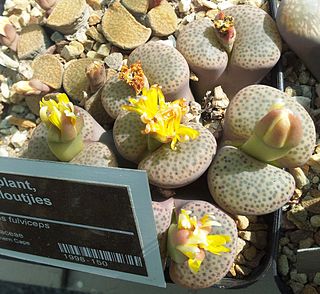
Lithops fulviceps is a species of plant in the family Aizoaceae. It occurs in a small region of southern Namibia and northern South Africa. Its natural habitats are rocky areas and cold deserts. It is threatened by habitat loss.

Lithops hermetica is a species of plant in the family Aizoaceae. It is endemic to Namibia. Its natural habitat is rocky areas. It was assessed by Lyndley Craven.
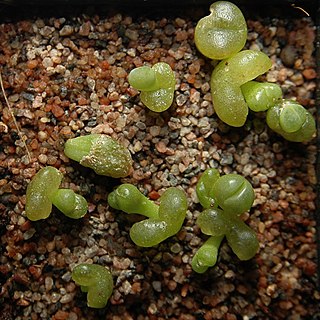
Lithops optica is a species of plant in the family Aizoaceae, endemic to Namibia.

Lithops vallis-mariae is a species of plant in the family Aizoaceae. It is endemic to Namibia. Its natural habitat is subtropical or tropical dry shrubland. It is threatened by habitat loss.

Lithops werneri is a species of plant in the family Aizoaceae. It is endemic to Namibia. Its natural habitat is rocky areas.
Lyndley Alan Craven was a botanist who became the Principal Research Scientist of the Australian National Herbarium.
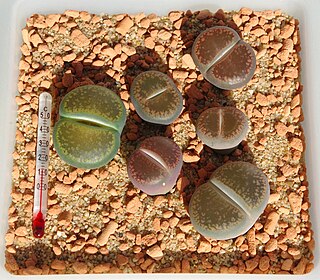
Lithops aucampiae is a species of flowering plant in the family Aizoaceae, found in South Africa. it was named after Juanita Aucamp, who found a specimen on her father's farm in Postmasburg, Northern Cape in 1929.

Lithops viridis is a species of plant in the family Aizoaceae.

Lithops salicola is a species of perennial plant in the family Aizoaceae, often called living stones, because of its resemblance to round grey pebbles.

Lithops francisci, commonly known as one of the living stones or pebble plants, is in the family Aizoaceae. It is endemic to the arid desert environments of Namibia. It is a succulent with a natural habitat in rocky areas. L. francisci was assessed by Nicholas Edward Brown in 1925. It is one of the Lithops plants and shares the characteristic bi-leaf head pattern separated by a deep fissure, the bottom of which houses and protects the stunted stem.
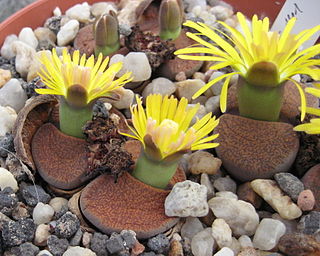
Lithops lesliei is a species of plant in the family Aizoaceae. The plant is collected for its medicinal properties, and has therefore become threatened.

Lithops hookeri is a species of plant in the genus Lithops, in the family Aizoaceae.

Lapidaria is a monotypic genus of dwarf succulent plants in the family Aizoaceae. The only species it contains is Lapidaria margaretae, also known as the Karoo rose.
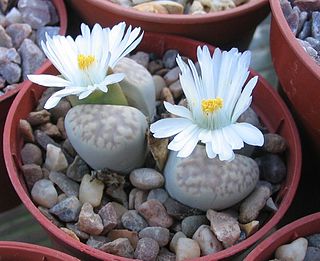
Lithops amicorum is a small succulent plant with white flowers, one of the smallest in the genus. It was named for the group of four friends who discovered it. It was collected by Desmond T. and Naureen A. Cole on 3 May 2004. After recent molecular analysis it was recombined to be a subspecies of Lithops karasmontana rather than its own species.

Lithops localis is a species of plant in the family Aizoaceae, indigenous to South Africa.
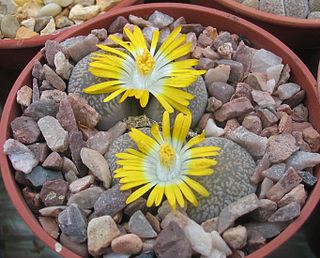
Lithops comptonii is a species of plant in the family Aizoaceae, indigenous to South Africa.

Lithops olivacea is a species of the genus Lithops under the family Aizoaceae. The name olivacea refers to the Latin word for olive (oliva) combined with the suffix -cea, meaning "of the likeness", producing the idea of "olive likeness". Lithops olivacea grow primarily in the Bushmandland of South Africa. They grow most abundantly in the regions of Aggeneys, Pofadder, and Namies. L. olivacea also received the Royal Horticultural Society's Award of Garden Merit for being "excellent for ordinary use in appropriate conditions, available to buy, of good constitution, essentially stable in form & colour, [and] reasonably resistant to pests & diseases."
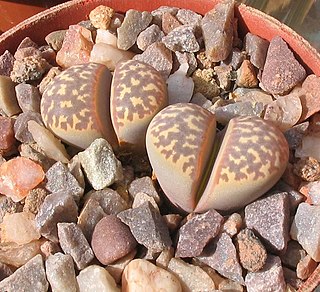
Lithops naureeniae is a species of pebble plant (Lithops). It is classified under the family Aizoaceae. The succulent is native to Southern Africa and has the ability to withstand the desert climate in which it lives. L. naureeniae was identified in 1980 by Desmond Cole, who became involved in Lithops research in 1947, from a specimen provided to him by Bruce Bayer, curator of the Karoo Botanic Garden, having been collected by Peter V. Bruyns in Namaqualand. It is named after Cole's wife, Naureen Cole. Cole wrote:
I therefore have pleasure in dedicating it to the person who, during the last fifteen years, directly and indirectly, has contributed more to research on and knowledge of the genus Lithops than any other—my wife, Naureen

Lithops meyeri is a species of living stone (Lithops), under the family Aizoaceae. It is native to Southern Africa and named after Rev. Gottlieb Meyer.





















